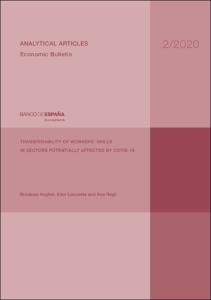Registro completo de metadatos
| Campo DC | Valor |
|---|---|
| dc.contributor.author | Anghel, Brindusa |
| dc.contributor.author | Lacuesta, Aitor |
| dc.contributor.author | Regil, Ana |
| dc.coverage.spatial | España |
| dc.date.accessioned | 2020-07-02T10:12:15Z |
| dc.date.available | 2020-07-02T10:12:15Z |
| dc.date.issued | 2020-05-20 |
| dc.identifier.uri | https://repositorio.bde.es/handle/123456789/13070 |
| dc.description | Artículo de revista |
| dc.description.abstract | This article analyses the characteristics of workers who are potentially more affected by the COVID-19 crisis and their employment possibilities in other productive sectors. Sectors related to travel, accommodation and food services, leisure and wholesale and retail trade, which have been particularly affected by the measures adopted to limit the impact of the pandemic, concentrate 19.6% of total employment in Spain. On the other hand, sectors related to distribution, logistics and information and communication –demand for which appears to be less affected or might even have increased during the lockdown– account for 7.4% of total employment. Among the workers from sectors that are most affected, the proportion of women, young adults, the lesser-skilled, and workers with less experience and with temporary contracts, is especially high. The analysis based on the tasks performed by workers in the different sectors suggests that the potential mobility of the employees that have been hardest hit by the crisis is scarce, especially in accommodation and food services and in wholesale and retail trade, in part owing to the limited intensity of use in those sectors of tasks associated with information and communication technologies, writing, reading and numerical skills. However, workers in sectors related to shipping and leisure or entertainment activities might have more opportunities of finding a job in other areas. These results point to the need to support training in certain skills for the potentially unemployed in the sectors most affected by the pandemic in order to facilitate their transition to new vacancies. |
| dc.format.extent | 13 p. |
| dc.language.iso | en |
| dc.publisher | Banco de España |
| dc.relation.ispartof | Economic Bulletin / Banco de España, 2/2020 |
| dc.relation.hasversion | Versión en español 123456789/12481 |
| dc.rights | Reconocimiento-NoComercial-CompartirIgual 4.0 Internacional (CC BY-NC-SA 4.0) |
| dc.rights | In Copyright - Non Commercial Use Permitted |
| dc.rights.uri | https://creativecommons.org/licenses/by-nc-sa/4.0/deed.es_ES |
| dc.rights.uri | http://rightsstatements.org/vocab/InC-NC/1.0/ |
| dc.subject | Occupational mobility |
| dc.subject | Occupations |
| dc.subject | COVID-19 |
| dc.subject | Labour market |
| dc.subject | Structural analysis |
| dc.subject | Economic situation |
| dc.title | Transferability of workers' skills in sectors potentially affected by Covid-19 |
| dc.type | Artículo |
| dc.identifier.bdebib | 000469117 |
| dc.identifier.bdepub | ECBU-2020-2B-art15 |
| dc.subject.bde | Relaciones laborales |
| dc.subject.bde | Mercado de trabajo |
| dc.publisher.bde | Madrid : Banco de España, 2020 |
| dc.subject.jel | J23 |
| dc.subject.jel | J24 |












